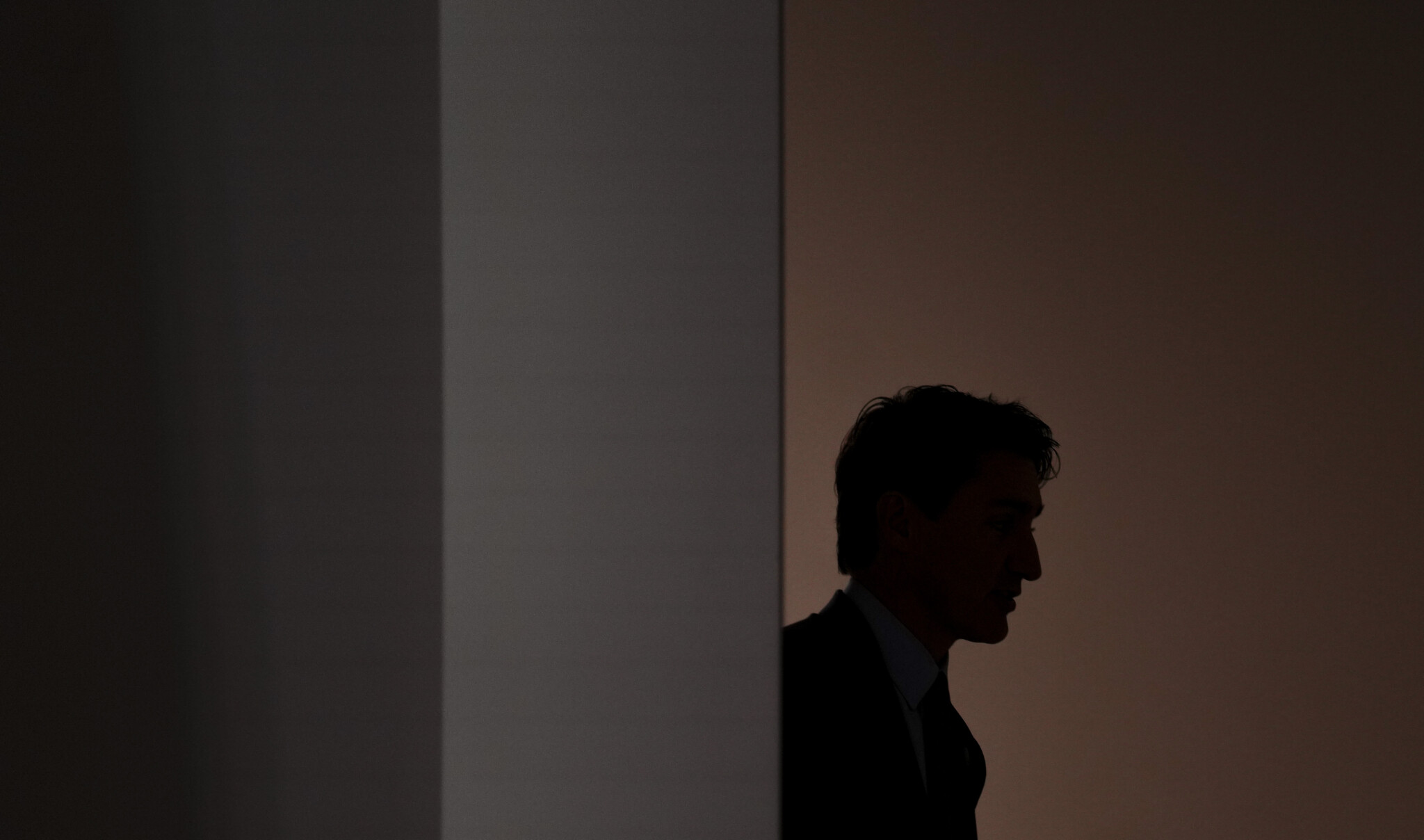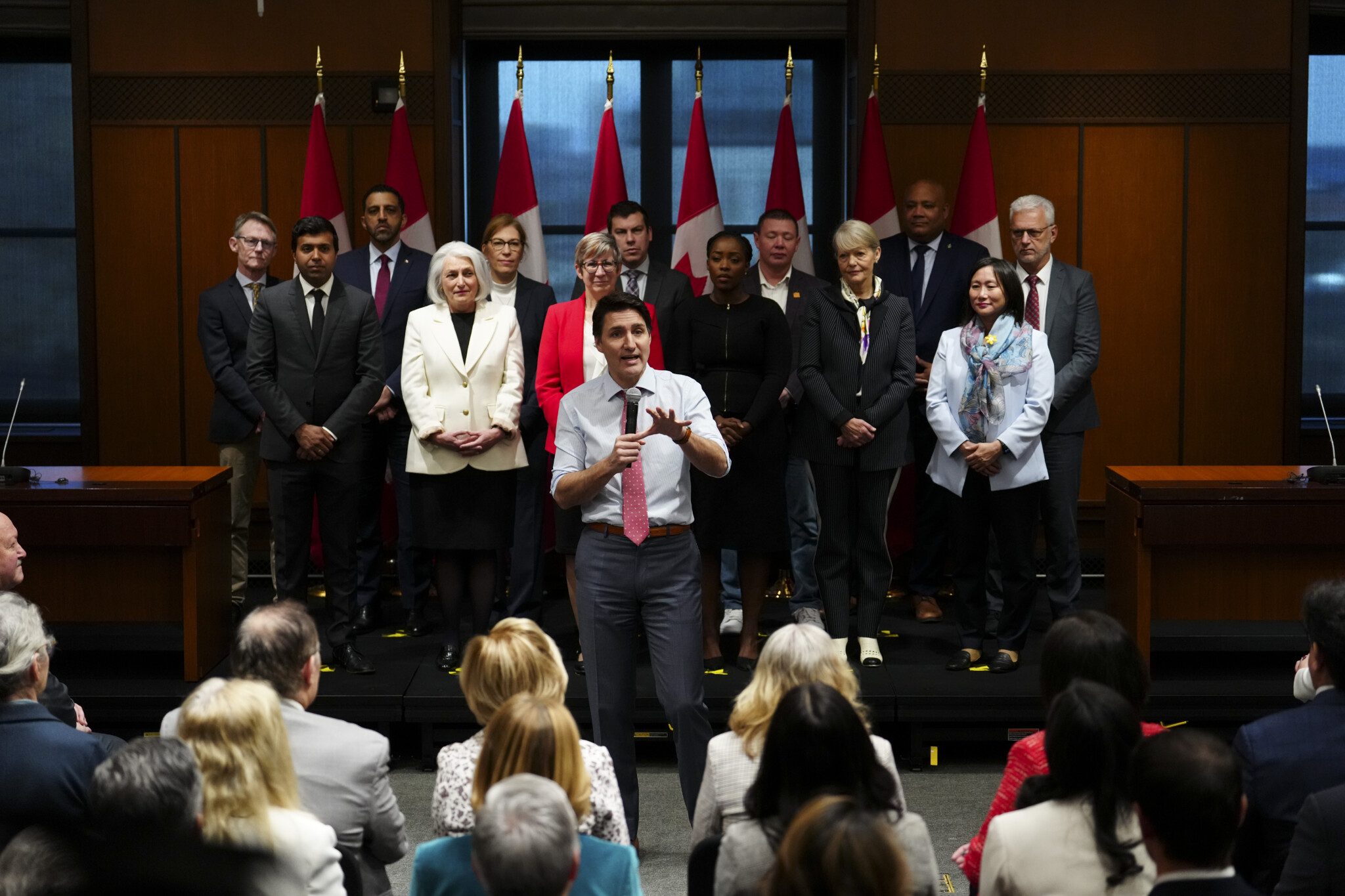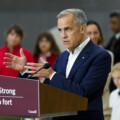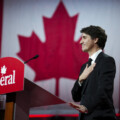The calls are now coming from inside the house. Yesterday, during a tense three-hour caucus meeting, Prime Minister Justin Trudeau faced a group of some 20 of his own MPs calling for him to consider stepping down as Liberal leader. They have reportedly given him a deadline of October 28 to resign. Simultaneously, a leaked Liberal grassroots petition began to make the rounds, describing an “existential crisis” in the party, and calling for an immediate secret ballot vote on his leadership. But against all these headwinds, Trudeau dug his heels in.
“The Liberal party is strong and united,” he told a group of reporters outside the caucus room.
The Hub has collected insights from a handful of wise political insiders to get their sense of how we should consider this moment in Canadian politics, whether Trudeau can weather this storm, and gauge where we are at in the prime ministerial lifespan of Justin Trudeau.
A serious political crisis
By Ian Brodie, former chief of staff to Stephen Harper and a professor of political science, University of Calgary
Mr. Trudeau faces a serious political crisis. Appointing Andrew Bevan as his new campaign director made things worse by showing he was serious about the “steady as she goes” approach to governing. More ministers are retiring before the deluge. Serious candidates are letting it be known in public that they’re ready to run for the Liberal Party leadership.
If he survives the caucus upheaval, Trudeau should be ready for a November/December election. And if he is ready, he should call it before he’s forced to call it. He’s well beyond the “nervous Nellies” phase of his government.
Immigration policy damage control
By Sean Speer, The Hub’s editor-at-large
As significant as yesterday’s Liberal caucus meeting was, the most notable development of the day may have been the growing reports that the Trudeau government is soon poised to reverse its failed immigration policy.
The causes behind the government’s political challenges are inherently multi-faceted. One can argue it’s as much about its underlying philosophy about the economy and its understanding of Canada itself as anything else.
One exception might be immigration policy. The Trudeau government’s recklessness has royally screwed up what used to be an advantage for Canada. Its precipitous increase in permanent residents and its completely irresponsible growth of temporary migrants has overwhelmed the country and put the public’s support for immigration at serious risk. It’s a monumental—and one can argue—disqualifying failure.
A forthcoming announcement that the government will cut back its annual immigration targets from historic highs is similar to how it’s tried to gaslight Canadians in the past to believe that its fiscal plan is responsible. Driving up the numbers to unsustainable levels and then bringing them back to semi-sustainable ones isn’t an exercise in prudence. It’s a case of political cynicism.
It’s difficult to assess the prime minister’s future at this stage. Any outcome is apparently possible. But one thing is clear: the Trudeau government’s mishandling of the immigration file will go down as its single biggest policy mistake.

Prime Minister Justin Trudeau arrives to hold a press conference at the Francophonie Summit in Paris, France, Oct. 5, 2024. Sean Kilpatrick/The Canadian Press.
Some Liberal backbenchers have grown a spine—will it be fatal?
By Howard Anglin, former deputy chief of staff to Prime Minister Stephen Harper, now a doctoral student at Oxford University
Scientists will tell you that the hagfish is the only animal that has a skull and no spine, but that is only because science has hitherto overlooked the Liberal Party caucus. So you can understand why the media is aflutter this week after learning that, in apparent confirmation of the late Stephen Jay Gould’s theory of punctuated equilibrium, two dozen Liberal MPs had suddenly joined the subphylum vertebrata.
Unfortunately, consistent with Gould’s hypothesis, this appears to be an example of cladogenesis, in which rather than evolving all together, a species divides into two distinct species. For now, a large majority of the caucus appears happy to remain political jellyfish.
This is good news for Justin Trudeau. As long as his cabinet and most of his MPs remain spineless, Trudeau’s position is secure. Time will tell, however, whether growing a backbone in Liberal politics is a useful trait that spreads, or a fatal, maladaptive development.
The Liberals who cried wolf
By Sabrina Maddeaux, political columnist
This is the political equivalent of the boy who cried wolf. Canadians were teased with rumors of an impending Liberal revolt that didn’t just fall flat on its face, but it lacked any decent revolt’s essential elements: mass mobilization and forceful action.
In other words, dissenters had no mob—the number of actual signatories fell well short of rumored expectations—and no pitchforks. Reportedly, only one person called for a secret ballot and there were no plans on how to respond to Trudeau’s inevitable refusal.
After the meeting, Liberal MPs muttered to media about “good discussion” and “candid conversations.” Yet, the time for discussion and conversation should be long gone given Trudeau’s clear unpopularity and unwillingness to meaningfully change.
That it’s not happening means there’s no real wolf—just sheep so sheepish most of them won’t even publicly identify as sheep. They pose little real immediate danger to Trudeau’s leadership.
Neither caucus nor Liberal grassroots organizers (what’s left of them) have any institutionalized power to force Trudeau out. If they really want him gone, they’re going to have to do a lot better than what amounted to an employee suggestion box submission and largely anonymous comments to the press.
Their added problem now is, even if they find it within themselves to act as wolves, will anyone believe they’re serious?
Can the plotters be bought off?
By Stephen Maher, a longtime political journalist and author of The Prince: The Turbulent Reign of Justin Trudeau.
Justin Trudeau bought himself some time at a caucus meeting yesterday, but he would be unwise to buy too many green bananas.
The high-stakes meeting did not end with his defenestration, but according to the Hill Times’ Abbas Ranna, who normally has good sources, 24 dissident Liberal MPs have given him until October 28th to step down. If they stand their ground, and are not bought off by or divided by promises of cabinet seats, they can make life so unpleasant for him that he may have to give in.
It’s that they are asking him to resign and let the caucus choose an interim leader, rather than having him hang around until his replacement is chosen. He doesn’t have to agree to that, but if they remain firm, he will be under increasing pressure to go.
When Trudeau left the caucus meeting, he said to reporters: “The Liberal party is strong and united.” But, saying that does not make it so. The party is weak and divided and the only way the plotters can succeed is by making sure it stays that way.
The worst of all worlds
By Jordan Leichnitz, veteran NDP strategist and former deputy chief of staff to the NDP leader, now running the Friedrich Ebert Stiftung’s Canadian program
The Liberals are in the worst of all worlds. Prime Minister Trudeau has been clear he wants to stay on, but he’s not willing to make any significant changes to his strategy to create a viable path to re-election. His internal critics, increasingly willing to go public, are numerous and loud enough to reinforce the idea that the Liberals are cynical, inward-looking, and divided—but not strong enough to push him out.
There’s no clear path to resolving this problem. Every day it continues to underline that this government is more focused on its own political survival than on the concerns of Canadians. There’s a clear opportunity for Singh and the NDP to pick up the mantle of progressive hope and positivity, and to present themselves as the party best placed to fight Conservative cuts, defend public healthcare, and deliver real help to improve people’s lives.
When someone shows you who they are, believe them
By JDM Stewart, head of JDM Policy and Communications and author of Being Prime Minister
There is a fantastic saying from American poet Maya Angelou: “When someone shows you who they are, believe them the first time.” The prime minister has already shown his caucus and Canadians who he is. He will make his decisions with his coterie of advisors who believe they know best. And pressure from a gaggle of backbenchers is not going to make a difference. This was the meeting that should have happened in June when the Liberals lost a by-election in Toronto-St. Paul’s. It never happened because that would have required a certain amount of humility which, let’s just say it, is not the PM’s strong suit. (To be fair, only a handful of PMs have had it).
That lack of introspection has always weighed down this PMO. Neither it, nor the PM at its centre, has a history of listening to those around them. Heck, even cabinet ministers have had trouble forging relationships with Trudeau. With that established track record, along with the quite weak “caucus rebellion,” I don’t see anything changing. Maya’s wisdom goes a long way.
The revolt may have fizzled but the root problems remain
By Darrell Bricker, global CEO for Ipsos Public Affairs
Today, Liberal MPs may be smiling, claiming they’ve had a productive conversation and are now unified in their goal of defeating the Conservatives. However, this optimism doesn’t erase the root problem that led to the showdown. The issues sparking internal dissent remain unresolved, and the party still teeters on the brink of electoral catastrophe. According to the latest Ipsos poll, the Liberals trail the Conservatives by 19 points, with 75 percent of voters expressing a desire for a change in government.
If the Liberals fail to change these numbers soon, the number of MPs who signed the letter or spoke out today is likely to grow, further deepening divisions within the party.

Prime Minister Justin Trudeau speaks to reporters during the 79th Session of the UN General Assembly at United Nations headquarters, Tuesday, Sept. 24, 2024. Sean Kilpatrick/The Canadian Press.
Replacing Trudeau may be the only way to split the “new” Conservative coalition
By David Coletto, founder, chair, and CEO of Abacus Data
The public opinion environment has never been worse for Prime Minister Trudeau and the Liberals. Only 15 percent of Canadians think the Liberals deserve re-election, and Trudeau’s personal reputation has never been so bad.
The environment is worse than it was a few weeks before Stephen Harper and the Conservatives were defeated nine years ago. Just before Stephen Harper lost in 2015, his net favourability was -19. Trudeau’s is now -37. Back then, 36 percent of Canadians thought the country was on the right track; today, it’s only 25 percent. Today, the Liberals’ accessible voter pool is just 38 percent today, slightly lower than Harper’s Conservatives before their defeat.
More revealing are the results of our recent poll. Thirty-five percent of current Liberal supporters want Trudeau to step aside. 21 percent of those who voted Liberal in 2021 want him to resign immediately.
But as Liberal MPs came out of the caucus meeting yesterday, they all agreed that defeating Pierre Poilievre was their main goal.
One of the few things holding together the “new” Conservative coalition is their collective dislike, disappointment, and dissatisfaction with Justin Trudeau. If the Liberals are serious about defeating Pierre Poilievre, my polling data suggests the best path forward means doing something that allows voters to focus on the future, and not on the past. The easiest way to do that might be to get a new leader.
This is about more than Trudeau
By Eric Lombardi, founder and president of More Neighbours Toronto, a volunteer organization committed to ending the housing crisis
The delayed push to replace Prime Minister Trudeau underscores the irony of Parliament’s failure to pass the initial 2014 version of the Reform Act, which could have automatically empowered Liberal MPs to challenge his leadership far sooner. Over the years, power has become overly concentrated in the PMO (and in provincial premiers’ offices), relegating MPs (or their provincial equivalents) to mere messengers rather than true representatives of their communities.
As the Liberals face likely defeat in the next election, a competitive leadership race—not a coronation—could breathe new life into both the party and the role of Parliament. A genuine debate on Canada’s future is overdue, and it would be healthy for our democracy. But that can’t happen with Trudeau at the top.
At its core, the Liberal government’s unravelling isn’t just due to Trudeau’s fatigue. It stems from ineffective governance and a refusal to fully own up to their failures—whether in immigration, procurement, defence, internal trade, or the environment. Replacing Trudeau alone won’t solve the entrenched issues of poor execution and sanctimonious communication, but it would offer Canadians the chance to move on. Voters deserve that. Now.

Prime Minister Justin Trudeau and Liberal members of Parliament observe a moment of silence on the tenth anniversary of the attack on Parliament, Oct. 22, 2024. Adrian Wyld/The Canadian Press.
Rumours of fireworks were greatly exaggerated
By Jeff Costen, a principal at Navigator and a former communications staffer for the Kathleen Wynne’s government
With few exceptions, the federal Liberal caucus has emerged from a much-anticipated meeting projecting acceptance, if not enthusiasm, about Prime Minister Trudeau’s continued leadership.
While Trudeau reportedly received an ultimatum to make a decision by October 28th, his caucus colleagues lack the tools (beyond public pressure) to challenge or recall their leader.
MPs’ on-the-record statements mostly follow a common theme, that after a necessary moment of reflection, Liberal knives should be directed outward rather than inward. Today, Prime Minister Justin Trudeau will announce a cut to Canada’s intake of permanent residents, likely eating up its own media cycle, with no indication of any caucus following through beyond a disgruntled few.
The notion that Liberals should put infighting aside to do everything they can to focus on the more important task of winning re-election is not a surprising one. But it needs to extend to the party’s leader and chief spokesperson himself.
In asking for unconditional commitment to the party’s best interests, Prime Minister Trudeau should accept that there is in fact a line where an individual’s personal aspirations should not be placed above Liberal electoral priorities. And that if he too cannot signal reform, demonstrate progress, or highlight a forward-looking vision that resonates in short order, then it’s time to do what’s best for the party.
The ultimate decision will be for Prime Minister Trudeau to make. But it should be made with that weight of responsibility in mind, with clear eyes about what he is seeking of his caucus and Liberals across Canada.
Discipline can be force-fed, but loyalty should be reciprocal.
Trudeau can’t outrun history
By Joanne Archibald, PhD candidate in History at Queen’s University
History is not on Justin Trudeau’s side. Only one Liberal leader—Sir Wilfrid Laurier—has ever won four consecutive elections between 1986 and 1908. He’s also a leader whose rhetoric Trudeau often calls upon in his speeches. (But I think it’s safe to say the “sunny ways” are over for Mr. Trudeau).
What the Liberal Party should want to avoid is a “Kim Campbell-ing” or a “John Turner-ing” of a new leader—whereby a new leader gets thrust into the role of prime minister, only to be decimated in an election shortly thereafter because Canadians are angry with the party, not just the person leading it.
Anyone who ascends to the top job in the next few months will (1) be painted with a Trudeau camp brush, and (2) won’t have much time to make a name for themselves before the October 2025 election. Most Canadians are ready for a change. Fair enough. But I don’t think a new Liberal leader is going to cut it.









